中考英语丨初中英语句型转换大全
中考英语句型转换
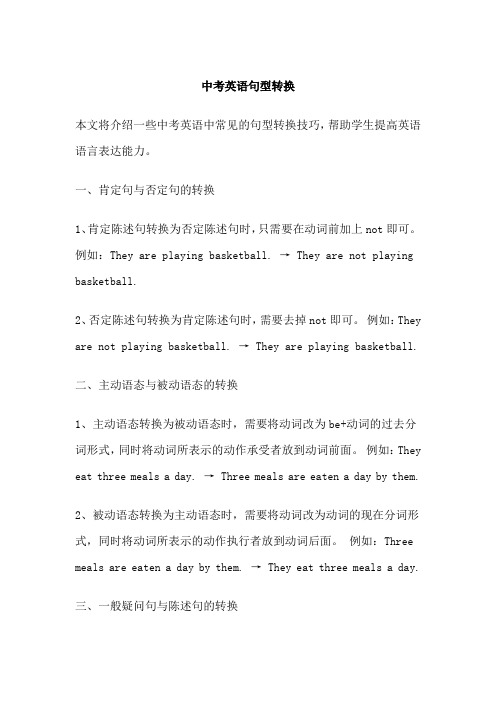
中考英语句型转换本文将介绍一些中考英语中常见的句型转换技巧,帮助学生提高英语语言表达能力。
一、肯定句与否定句的转换1、肯定陈述句转换为否定陈述句时,只需要在动词前加上not即可。
例如:They are playing basketball. → They are not playing basketball.2、否定陈述句转换为肯定陈述句时,需要去掉not即可。
例如:They are not playing basketball. → They are playing basketball.二、主动语态与被动语态的转换1、主动语态转换为被动语态时,需要将动词改为be+动词的过去分词形式,同时将动词所表示的动作承受者放到动词前面。
例如:They eat three meals a day. → Three meals are eaten a day by them.2、被动语态转换为主动语态时,需要将动词改为动词的现在分词形式,同时将动词所表示的动作执行者放到动词后面。
例如:Three meals are eaten a day by them. → They eat three meals a day.三、一般疑问句与陈述句的转换1、一般疑问句转换为陈述句时,需要将动词改为相应的陈述语气,同时将主语放到动词后面。
例如:Are they playing basketball? →They are playing basketball.2、陈述句转换为一般疑问句时,需要将动词改为一般疑问语气,同时将主语放到动词前面。
例如:They are playing basketball. →Are they playing basketball?四、时间状语从句的转换1、现在时态的时间状语从句转换为过去时态的时间状语从句时,需要将动词改为过去时态。
例如:I will go to the park tomorrow. → I went to the park yesterday.2、过去时态的时间状语从句转换为现在时态的时间状语从句时,需要将动词改为现在时态。
初中英语知识点归纳常用句型及句式转换

初中英语知识点归纳常用句型及句式转换英语学习中,句型和句式是非常重要的基础知识。
掌握常用的句型和灵活运用句式可以帮助我们更好地理解英语语法和提高语言表达能力。
下面是初中英语中常见的句型和句式转换的归纳总结。
一、肯定句和否定句的转换1. 肯定句:主语 + 动词 + 其他成分否定句:主语 + 助动词 do/does/did + not + 动词 + 其他成分例句:He is a doctor.(肯定句)He is not a doctor.(否定句)2. 肯定句:主语 + am/is/are + 名词/形容词 + 其他成分/地点/时间否定句:主语 + am/is/are + not + 名词/形容词 + 其他成分/地点/时间例句:They are students.(肯定句)They are not students.(否定句)3. 肯定句:主语 + 动词 + 副词/介词短语 + 其他成分否定句:主语 + 助动词 do/does/did + not + 动词 + 副词/介词短语 + 其他成分例句:She speaks English fluently.(肯定句)She does not speak English fluently.(否定句)二、一般疑问句和特殊疑问句的转换1. 一般疑问句:肯定句:Do/Does/Did + 主语 + 动词 + 其他成分?否定句:Do/Does/Did + 主语 + 动词 + not + 其他成分?特殊疑问句:疑问词 + 一般疑问句的语序例句:She goes to school by bus.(一般疑问句)Does she go to school by bus?(特殊疑问句)2. 一般疑问句:肯定句:Am/Is/Are + 主语 + 名词/形容词 + 其他成分/地点/时间?否定句:Am/Is/Are + 主语 + not + 名词/形容词 + 其他成分/地点/时间?特殊疑问句:疑问词 + 一般疑问句的语序例句:They are students.(一般疑问句)Are they students?(特殊疑问句)3. 一般疑问句:肯定句:助动词 + 主语 + 动词 + 副词/介词短语 + 其他成分?否定句:助动词 + Do/Does/Did + 主语 + 动词 + not + 副词/介词短语 + 其他成分?特殊疑问句:疑问词 + 一般疑问句的语序例句:He speaks English fluently.(一般疑问句)Does he speak English fluently?(特殊疑问句)三、陈述句和祈使句的转换1. 陈述句:主语 + 动词 + 其他成分祈使句:动词 + 其他成分(一般省略主语 you)例句:They play football.(陈述句)Play football.(祈使句)2. 陈述句:主语 + am/is/are + 名词/形容词 + 其他成分/地点/时间祈使句:Be + 名词/形容词 + 其他成分/地点/时间例句:You are a student.(陈述句)Be a student.(祈使句)3. 陈述句:主语 + 动词 + 副词/介词短语 + 其他成分祈使句:动词 + 副词/介词短语 + 其他成分例句:She speaks English fluently.(陈述句)Speak English fluently.(祈使句)通过以上的归纳总结,我们可以更好地理解和运用常用的句型和句式转换。
中考英语(句型转换50篇)
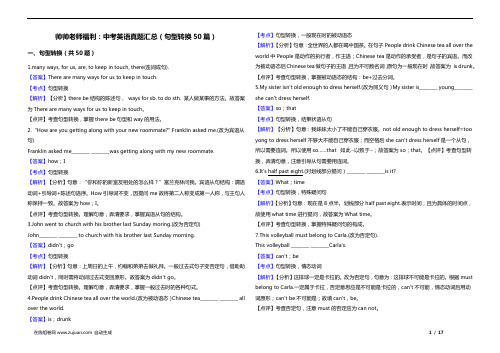
帅帅老师福利:中考英语真题汇总(句型转换50篇)一、句型转换(共50题)1.many ways, for us, are, to keep in touch, there(连词成句).【答案】There are many ways for us to keep in touch.【考点】句型转换【解析】【分析】there be结构的陈述句,ways for sb. to do sth. 某人做某事的方法。
故答案为There are many ways for us to keep in touch。
【点评】考查句型转换,掌握there be句型和way的用法。
2.“How are you getting along with your new roommate?" Franklin asked me.(改为宾语从句)Franklin asked me________ ________was getting along with my new roommate.【答案】how;I【考点】句型转换【解析】【分析】句意:“你和你的新室友相处的怎么样?”富兰克林问我。
宾语从句结构:谓语动词+引导词+陈述句语序。
How引导词不变,因提问me故将第二人称变成第一人称,与主句人称保持一致。
故答案为how;I。
【点评】考查句型转换。
理解句意,弄清要求,掌握宾语从句的结构。
3.John went to church with his brother last Sunday moring.(改为否定句)John________ ________ to church with his brother last Sunday morning.【答案】didn't;go【考点】句型转换【解析】【分析】句意:上周日的上午,约翰和弟弟去做礼拜。
一般过去式句子变否定句,借助助动词didn't,同时需将动词过去式变回原形。
中考常考的词汇拼写和句型转换技巧归纳
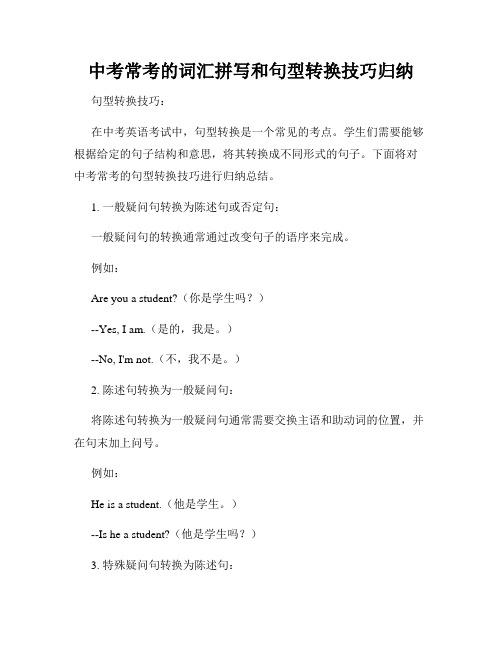
中考常考的词汇拼写和句型转换技巧归纳句型转换技巧:在中考英语考试中,句型转换是一个常见的考点。
学生们需要能够根据给定的句子结构和意思,将其转换成不同形式的句子。
下面将对中考常考的句型转换技巧进行归纳总结。
1. 一般疑问句转换为陈述句或否定句:一般疑问句的转换通常通过改变句子的语序来完成。
例如:Are you a student?(你是学生吗?)--Yes, I am.(是的,我是。
)--No, I'm not.(不,我不是。
)2. 陈述句转换为一般疑问句:将陈述句转换为一般疑问句通常需要交换主语和助动词的位置,并在句末加上问号。
例如:He is a student.(他是学生。
)--Is he a student?(他是学生吗?)3. 特殊疑问句转换为陈述句:特殊疑问句转换为陈述句需要将原句的疑问词替换为陈述句中对应的词语。
例如:What is your name?(你叫什么名字?)--My name is Mike.(我的名字叫迈克。
)4. 否定句转换为肯定句或一般疑问句:否定句转换为肯定句通常需要去掉否定词,并改变动词形式为肯定形式。
例如:I don't like bananas.(我不喜欢香蕉。
)--I like bananas.(我喜欢香蕉。
)否定句转换为一般疑问句则要交换助动词和主语的位置,并在句末加上问号。
例如:I don't like basketball.(我不喜欢篮球。
)--Don't you like basketball?(你不喜欢篮球吗?)5. 直接引语转换为间接引语:直接引语转换为间接引语通常需要改变动词的时态和人称,并在引语前后加上引号。
例如:"I like swimming," he said.(他说:“我喜欢游泳。
”)--He said that he liked swimming.(他说他喜欢游泳。
)词汇拼写技巧:除了句型转换,词汇拼写是中考英语考试中另一个常见的考点。
中考英语 句式转换(带练习)

知识点二:句式转换一、陈述句与疑问句、祈使句、感叹句间的转换(时态不变)1、陈述句中肯定句变为否定句,大部分是用not来改变谓语结构,但也有借用否定意义的词,如nothing, nobody, none, neither, little, few, never, hardly等;例:He has much to do.——He has nothing to do.All of my classmates like art.——None of my classmates likes art.2、陈述句改为疑问句。
根据上下句的结构来判断变为哪一种形式的疑问句。
例如:(1)My brother often has breakfast at school.______your brother_____ _______ breakfast at school?(2)Tom’s already weak in English.Tom’s already weak in English, _____ _____ ?3、陈述句改为感叹句。
What+a/an+形容词+名词+主语+谓语&How+形容词/副词+主语+ 谓语。
例如:This is an interesting book.——____ ____ interesting book ____ ____! 或____ ____ the book ___!二、同义句转换。
1、同义词或词组之间的转换。
(通常上下句时态保持一致)。
例:The children had a good time in the park.——The children _______ _______themselves in the park.常见的同义词或词组有:1 alone=by oneself2 actually=in fact3 also=too=as well4 stop sb from doing sth—keep/preventsb from doing sth5 arrive in(at)/=get to=reach6 at once=right now7 continue/go on doing8 cost=spend=take=pay9 cross=go across10 sometimes/=at times11 die/=lose one’s life12 now/at the moment13 like/love/enjoy/be fond of/be interested in/care for14 be good at /do well in15 maybe/perhaps/may be16 will/be going to/be about to17 want/would like18 can/be able to/have the ability to do19 visit/call on20 happen/take place21 should/ought to/be supposed to22 decide/make a decision/make up one’s mind23 found/establish/set up24 finally/at last/in the end25 leave/be away26 return/give back27 whatever/no matter what28 over/more than29 no longer—not …any longer30 whenever/no matter when31at the age of/when sb.+be+…years old32 everywhere/here and there33 help sb with (doing)sth/help sb (to)do34 be full of sth —be filled with sth35 due to/thanks to/because (of)36 all over the world/around the world37 be different from/not the same as38 be full of/be filled with2、同义句型之间的转化。
中考英语句型转换1
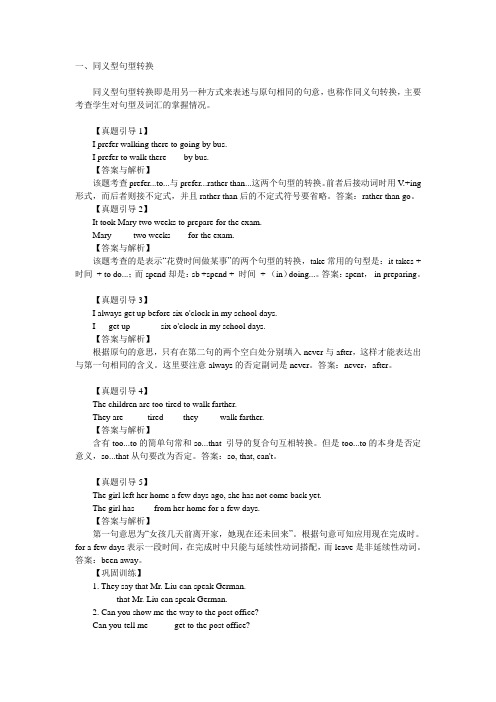
一、同义型句型转换同义型句型转换即是用另一种方式来表述与原句相同的句意,也称作同义句转换,主要考查学生对句型及词汇的掌握情况。
【真题引导1】I prefer walking there to going by bus.I prefer to walk there ___ by bus.【答案与解析】该题考查prefer...to...与prefer...rather than...这两个句型的转换。
前者后接动词时用V.+ing 形式,而后者则接不定式,并且rather than后的不定式符号要省略。
答案:rather than go。
【真题引导2】It took Mary two weeks to prepare for the exam.Mary ____ two weeks ___ for the exam.【答案与解析】该题考查的是表示“花费时间做某事”的两个句型的转换,take常用的句型是:it takes +时间+ to do...;而spend却是:sb +spend + 时间+ (in)doing...。
答案:spent,in preparing。
【真题引导3】I always get up before six o'clock in my school days.I __ get up ______ six o'clock in my school days.【答案与解析】根据原句的意思,只有在第二句的两个空白处分别填入never与after,这样才能表达出与第一句相同的含义。
这里要注意always的否定副词是never。
答案:never,after。
【真题引导4】The children are too tired to walk farther.They are_____ tired ____they ____ walk farther.【答案与解析】含有too...to的简单句常和so...that 引导的复合句互相转换。
初中英语总复习之句型转换总结
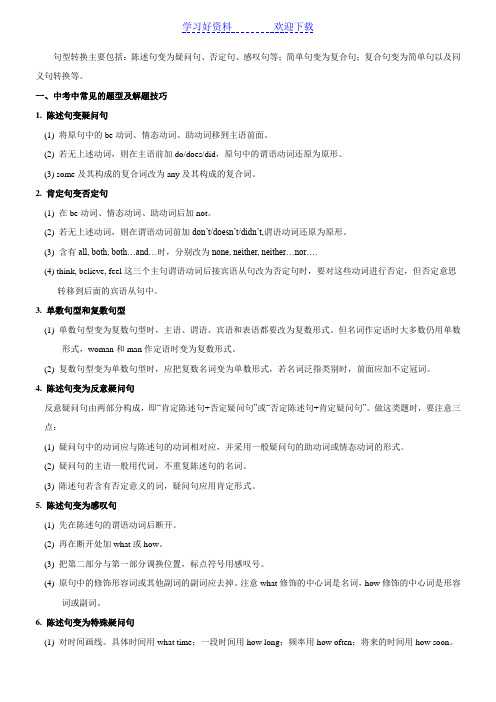
句型转换主要包括:陈述句变为疑问句、否定句、感叹句等;简单句变为复合句;复合句变为简单句以及同义句转换等。
一、中考中常见的题型及解题技巧1. 陈述句变疑问句(1) 将原句中的be动词、情态动词、助动词移到主语前面。
(2) 若无上述动词,则在主语前加do/does/did,原句中的谓语动词还原为原形。
(3) some及其构成的复合词改为any及其构成的复合词。
2. 肯定句变否定句(1) 在be动词、情态动词、助动词后加not。
(2) 若无上述动词,则在谓语动词前加don’t/doesn’t/didn’t,谓语动词还原为原形。
(3) 含有all, both, both…and…时,分别改为none, neither, neither…nor….(4) think, believe, feel这三个主句谓语动词后接宾语从句改为否定句时,要对这些动词进行否定,但否定意思转移到后面的宾语从句中。
3. 单数句型和复数句型(1) 单数句型变为复数句型时,主语、谓语、宾语和表语都要改为复数形式。
但名词作定语时大多数仍用单数形式,woman和man作定语时变为复数形式。
(2) 复数句型变为单数句型时,应把复数名词变为单数形式,若名词泛指类别时,前面应加不定冠词。
4. 陈述句变为反意疑问句反意疑问句由两部分构成,即“肯定陈述句+否定疑问句”或“否定陈述句+肯定疑问句”。
做这类题时,要注意三点:(1) 疑问句中的动词应与陈述句的动词相对应,并采用一般疑问句的助动词或情态动词的形式。
(2) 疑问句的主语一般用代词,不重复陈述句的名词。
(3) 陈述句若含有否定意义的词,疑问句应用肯定形式。
5. 陈述句变为感叹句(1) 先在陈述句的谓语动词后断开。
(2) 再在断开处加what或how。
(3) 把第二部分与第一部分调换位置,标点符号用感叹号。
(4) 原句中的修饰形容词或其他副词的副词应去掉。
注意what修饰的中心词是名词,how修饰的中心词是形容词或副词。
中考英语句型转换专项练习(6页 20题)(含解析)Word

中考英语句型转换【考情分析】句型转换考察的有否定句/肯定句,特殊/一般疑问句,感叹句,对画线部分提问等【破解方法】句型转换这类题难度不会很大,我们需要细心,写can’t 还是don’t ,疑问词用how还是what等疑问词1.问“谁”用who;2.问“谁的”,用whose;3.问“地点哪里”,用where;4.问“原因”,用why;5.问“身体状况”,用how;6.问“方式”,用how;7.问“年龄”,用how old;8.问“多少”,用how many;9.问"价钱”用how much;10.问“哪一个”,用which ;11.问“什么”,用what;12.问“职业”,用what;13.问“颜色”,用what colour;14.问“星期”,用what day;15.问什么学科,用what subject;16.问“什么时候”,用when;17.问几点What's the time?或What time is it?【例题展示】一.请根据要求改写下列句子,每空一词。
1. It took them five days to complete the difficult task. (对划线部分提问)_____ _____ did it take them to complete the difficult task?2. The girl gave a rather wonderful speech last Friday. (改为感叹句)_____ _____ wonderful speech the girl gave last Friday!3. The students in our school are polite. They never push in before others. (合并为一句)The students in our school are _____ polite _____ push in before others.4. Suzy didn’t know when she would take a boat trip on the lake. (保持句意基本不变) Suzy didn’t know _____ _____ take a boat trip on the lake.5. Dr. Ma cured the old man’s serious eye problem two months ago. (改为被动语态) The old man’s serious eye problem _____ _____ by Dr. Ma two months ago.专题训练题组A一.请根据要求改写下列句子,每空一词。
- 1、下载文档前请自行甄别文档内容的完整性,平台不提供额外的编辑、内容补充、找答案等附加服务。
- 2、"仅部分预览"的文档,不可在线预览部分如存在完整性等问题,可反馈申请退款(可完整预览的文档不适用该条件!)。
- 3、如文档侵犯您的权益,请联系客服反馈,我们会尽快为您处理(人工客服工作时间:9:00-18:30)。
中考英语丨初中英语句型转换大全展开全文一、陈述句与疑问句、祈使句、感叹句间的转换1、陈述句中肯定句变为否定句,大部分是用not来改变谓语结构,但也有借用否定意义的词,如nothing, nobody, none, neither, little, few, never, hardly等,例如:A:T om does well in maths.B:Tom doesn't do in maths.A:He has much to do.B:He has nothing to do.A:All of my classmates like art.B:None of my classmates likes art.2、改为疑问句。
根据上下句的结构和词的减少,来判断变为哪一种形式的疑问句。
例如:A:My brother often has breakfast at school.B: Does your brother often have breakfast at school?A:T om's already weak in English.B:Tom's already weak in English, isn't he ?A:The red light changes every two minutes.B:How often does the red light change?3、改为感叹句。
根据所给的句子结构和单词的词性,来确定使用哪一种感叹句的形式,例如:A:This is an interesting book.B:What an interesting book this is!或 How interesting this book is!二、同义句转换。
根据上句,写出一个意思相同(或相近)的下句,此类形式繁多,内容复杂,涉及面广,归类如下:1、同义词或词组之间的转换。
(通常上下句时态保持一致)。
常见的同义词或词组有:(1)四个“花费”(spend-take-cost-take);(2)三个“到达”(get to/reach/arrive in/aat);(3)四个“收到…来信”(hear from/get a letter from/receive a letter from/have a letter from);(4)两个“擅长于…”(be good at /do well in);(5)两个“有空”(be free/have time);(6)三个“入睡”(go to sleep/get to sleep/fall asleep);(7)两个“玩得开心”(enjoy oneself/have a good time);(8)“给…打电话”(call sb-telephone sb/ring sb. a call/makea telephone to sb.)(9)“飞往…”(fly to…-go to…by air/plane)(10)“自学”(teach oneself/learn…by oneself)(11)在…方面帮助help…with…/help… (to)do…(12)在…差be weak in…/do badly in…(13)能/会…:can/be able to(14)更喜欢…like…better than…/prefer…to…(15)充满了…:be full of…/be filled with…(16)放弃做…:give up doing…/stop doing…(17)不再…:no longer/not …any longer(18)照顾/保管:take care of…/look after(19)展览:on show/on display(20)阻止…干…:stop…from doing-keep/prevent…from doing…(21)由于:thanks to/because of…(22)举手:hands up/put up one's hands(23)最后,终于:at last/in the end(24)与…不同:be different from…/be not the same as…(25)从…借入…:borrow…from…/lend…to…(26)乘公汽/火车/的士:go to…by bus/train/taxi-take a bus /train/taxi to…(27)乘自行车去… :go to…by bike/ride a bike to…(28)为…感到自豪:be p roud of…/be the pride of…(29)步行去… walk to…=go to…on foot(30)独自地by oneself =alone等。
例如:A:The children had a good time in the park.B:The children enjoyed themselves in the park.2、同义句型之间的转化。
常见的同义句型有:①It seems that 从句→Somebody seems(to be)+adj/n②It's kind of sb. to do…→Somebody is kind to do…③What does…mean?→What do you mean by…? 或What's the meaning of…?④There is something wrong with…→Something is wrong with…⑤not…until…与when/after/before引导的时间状语从句的转换⑥What's wrong with…?→What's the matter with…?⑦How is…?→What's…like…?⑧How do you like…?→What do you think of?⑨It's time that…→It's time for sb. to do…(10)It's said that…→People say that…⑩Can I help you? →What can I do for you?例如:A:I went to bed after I finished my homework.B:I didn't go to bed until I finished my homework.3、if引导的条件状语从句的转化。
例如:A:If it doesn't rain tomorrow, they'll go to the park.B:Unless it rains tomorrow, they'll go to the park.A:If you don't hurry, you'll be late.B:Hurry up, or you'll be late.A:Fish can't live if there is no water.B:Fish can't live without water.4、现在完成时态中的一句多译。
在现在完成时态中,结束性动词不能与时间段连用,必须改成相应的延续性动词。
常见的动词转换有:buy-have, borrow-keep, die-be dead, open-be open, join-be in+组织/be a +成员, begin-be on, leave-be away from, close-be closed, arrive in/ get to/ come/go to-be in/at, finsh-be over, go to sleep-be asleep,get up-be up.例如:The old man died five months ago.The old man has been dead since five months ago.The old man has been dead for five months.It's five months since the old man died.Five months has passed since the old man died.5、简单句与复合句之间的转换。
①含宾语从句的复合句与简单句的转换。
例如:A:I saw they were playing football on the playground.B:I saw them playing football on the playground.A:The teacher found that she was very clever.B:The teacher found her very clever.A:He found that it was hard to learn English well.B:He found it hard to learn English well.A:We are sure that we will win to first match.B:We are sure to win to first match.①.由疑问代词/副词引导的宾语从句可转化为“疑问句+不定式”结构。
例如:A:Could you tell me how I can get to the railway station?B:Could you tell me how to get to the railway station?A:We don't know what we should do next.B:We don't know what to do next.②由when/after/before/while/since/until引导的时间状语从句可转化为when/after/before/while/sine/until + doing…例如:A:They went home after they finished their work.B:The went home after finishing their work.A:Mr Smith has taught English since he came to China.B:Mr Smith has taught English since coming to China.When sb. +be+数词+years old→at the age of+岁数A:When he was twelve years old, Edison started writing his own newspaper.B:At the age of twelve, Edison started writing his own newspaper.③由so…that…引导的结果状语从句可转化为too…to do 或…enough to do……例如:A:The box is so heavy that I can't carry it.B:The box is too heavy for me to carry.或:The box isn't light enough for me to carry.A:The child is so old that he can go to school.B:The child is old enough to go to school.④由so that 引导的目的状语从句可转化为in order to do例如:A:My father got up early this morning so that he could catch the early bus.B:My father got up early this morning in order to catch the early bus.⑤由because 引导的原因状语从句可转化为because of…例如:A:We didn't go to the park because it rained.B:We didn't go to the park because of the rain.⑥定语从句可以转化为介词短语或分词短语。
